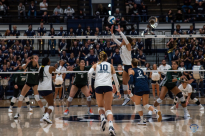What’s Next for Penn State Football?
Overmatched.
The first word that comes to mind given the context of last Saturday’s defeat to the Michigan
Wolverines in Ann Arbor, losing by a final of 42-7. Penn State was incapable of moving the ball,
its defense faltered in the final stages of the third and all the fourth quarter, and their special
teams proved to be of no threat. With that being said, the question looms: Where does the Penn State football go from
here?
The reality is, there is still a lot to play for. The Nittany Lions may have lost a key recruiting
battle in Ann Arbor, but there are still the likes of Rutgers and Maryland remaining on the
schedule. To many Penn State fans, these games are nothing more than guaranteed wins, given
Penn State’s combined record of 64-4-1 against those two respective opponents. Nonetheless,
these games matter -- New Jersey and Maryland are huge states of recruiting interest for this
program -- as made obvious by the 11 New Jersey and 17 Maryland residents on the current roster.
These games should be pushovers, but with the recent turmoil in Maryland motivating its players
and the Scarlet Knights playing a relatively competitive game against Penn State’s next
opponent, the Wisconsin Badgers, one must wonder: Is any game a certainty anymore?
If Penn State wants to get to 9-3 heading into their Outback Bowl matchup against one of the
SEC’s finest, a lot is going to have to change between now and this Saturday’s noon kickoff
against the Wisconsin Badgers. First and foremost, Trace McSorley’s injury situation needs to be
addressed. Playing with a knee brace for the first time in his career, it was quite evident in the
“Big House” that the fifth-year senior was not his usual self. He turned in arguably his worst
statistical game yet, completing only 5/13 passes for 83 yards, plus an interception. Backup
quarterback Tommy Stevens fared slightly better, although he did throw a pick six.
McSorley is clearly shaken up-he isn’t as mobile as he was earlier in the season, he’s quick to
duck his head into the rush, and the downfield vertical threat of this passing offense is all but
gone. Just ask DeAndre Thompkins, he had the closest view of any of us on McSorley’s heave to
Toledo at the end of the second quarter.
Defensively, the team is fine. Defensive coordinator Brent Pry’s unit has played out of its
mind for the better part of three quarters, compensating for a lackadaisical offense that couldn’t
stay on the field. This young defense is shaping up quickly, and key veterans such as cornerback John
Reid appear to be back for good. True freshman linebacker Micah Parsons is slowly coming into
his own, and the defense returns several key contributors next year, aside from the departures of
the fifth year secondary duo of Nick Scott and Amani Oruwariye.
Pry’s group is the least of the Nittany Lions’ concerns, contrary to the what many Penn State faithful may have suspected in the wake of the Appalachian State debacle. No, the problem, instead, lies within the offense; a unit that is led by first-year coaches in their positions at wide receiver, offensive coordinator and tight end, although tight end coach Tyler Bowen did coach tight ends at the FCS level in the past (mind you, a mere two years ago).
The offensive coaching staff is an inexperienced bunch, and it’s begun to show in recent weeks. Losing three of their last five games, a recurring theme has been the inability to sustain any semblance of consistency on offense. The frustration finally took its toll against Michigan, as players such as wide receiver KJ Hamler were noticeably upset with the offense.
To many, this season may seem like a lost cause, and to an extent, they’re right. With three
losses, all New Year’s Six bowls are out of the picture, and if the Nittany Lions can win the next
three games in which they’re favored, they will likely head to a Florida bowl game. There’s still
a lot at stake with a 6-3 record: the program’s pride, recruiting purposes and quality of
postseason play are still all up for grabs. Yet, soon, head coach James Franklin is going to have
to ask himself some tough questions, and most importantly, the following: How do I get this
“great” program on the track to becoming “elite”?
Andrew Destin is a freshman majoring in broadcast journalism. To contact him, email
ajd6360@psu.edu.







